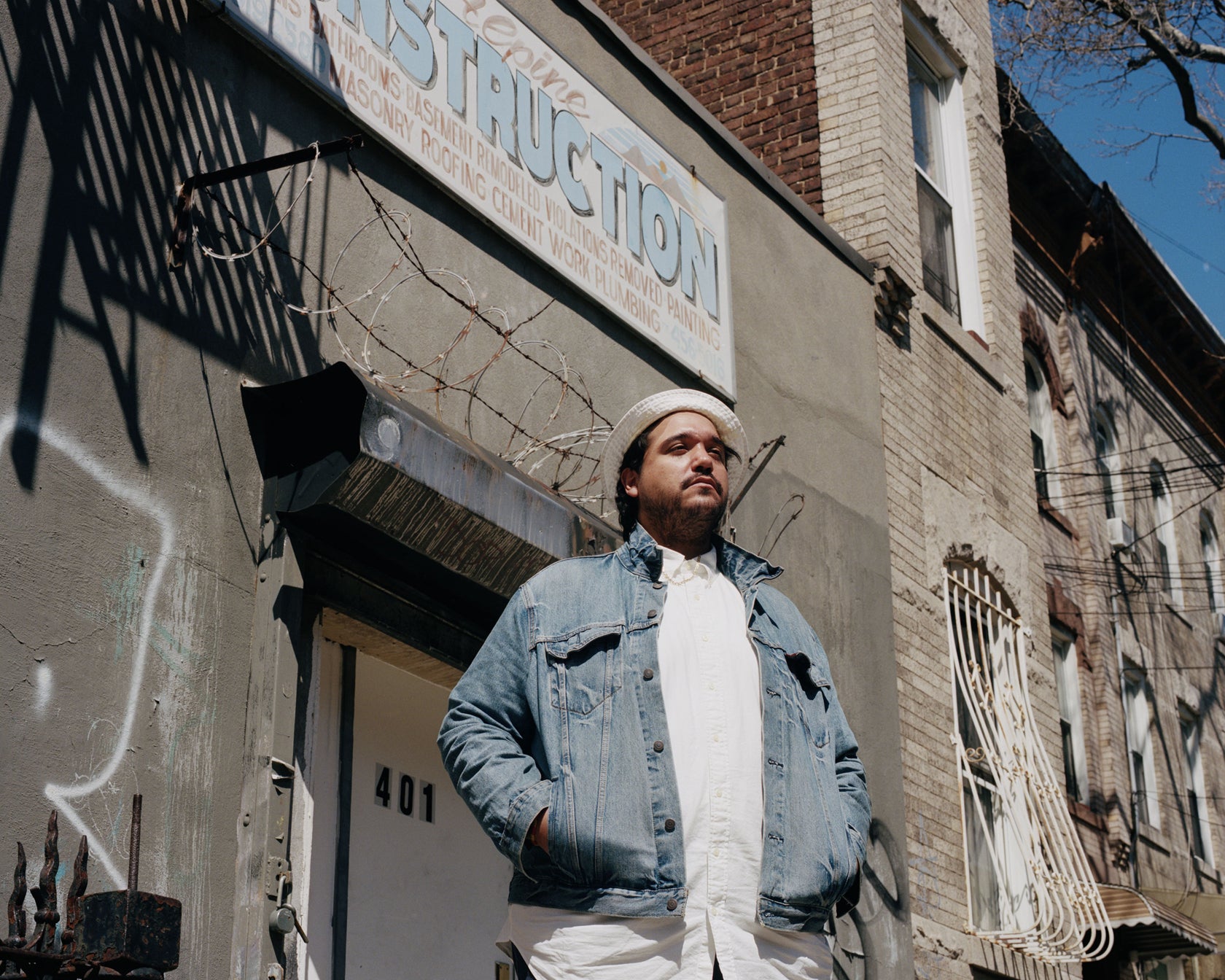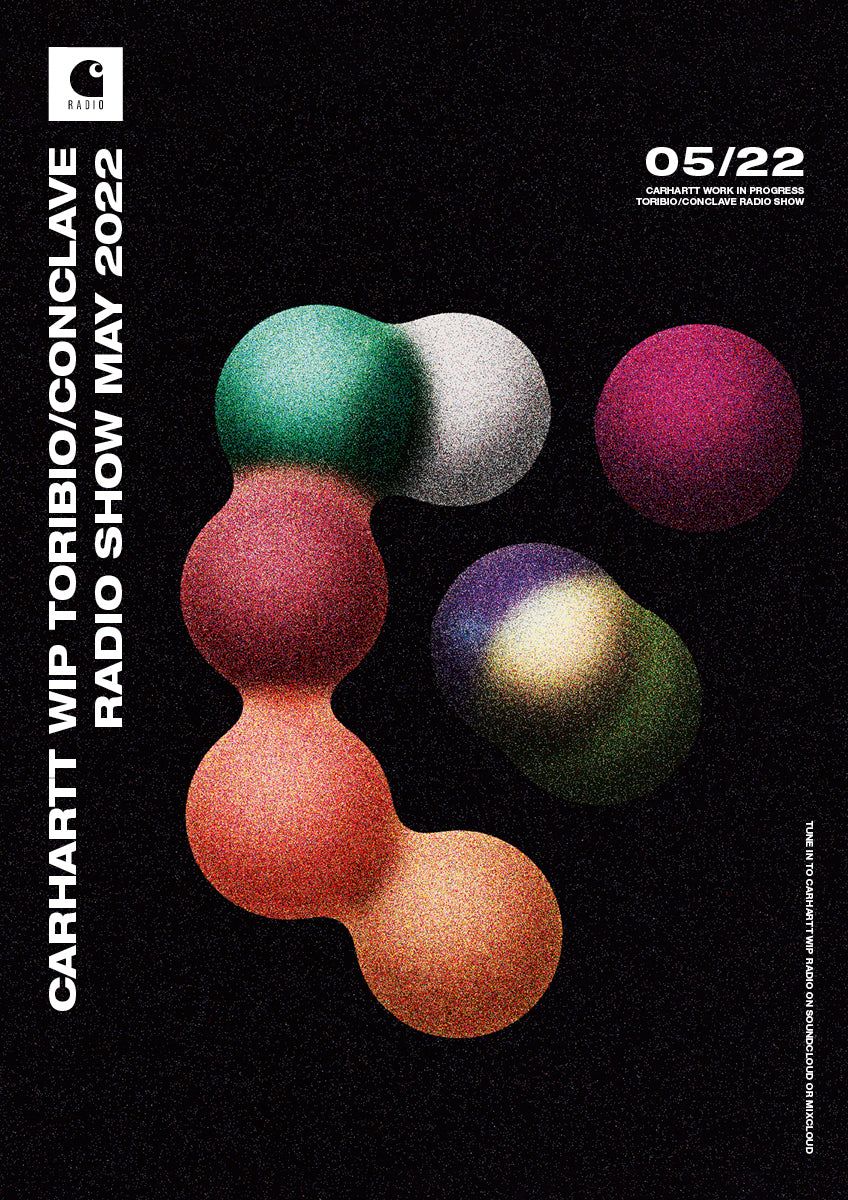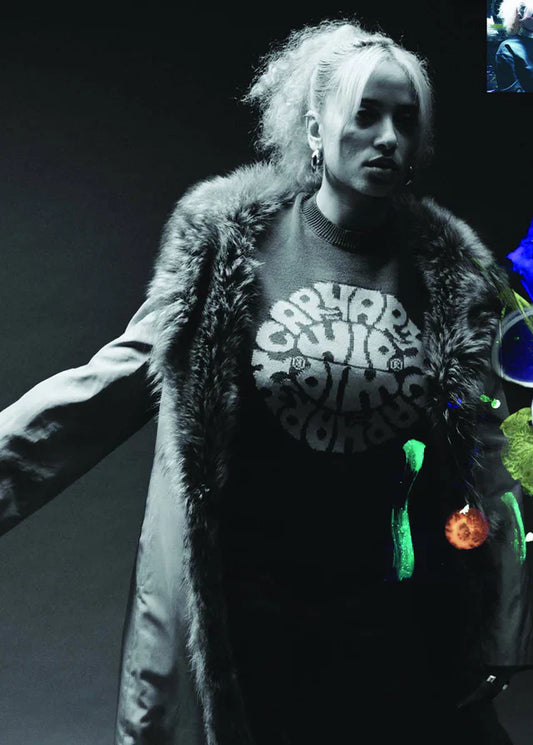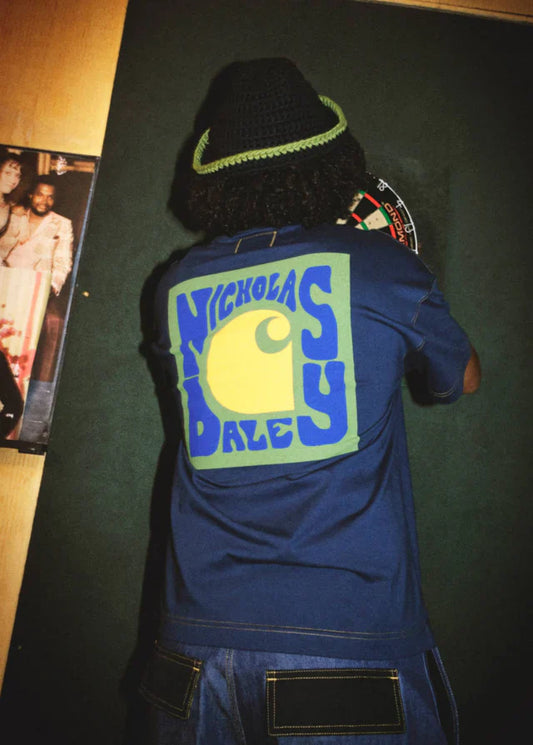Click here to listen to the Carhartt WIP Radio Show featuring Toribio.
This month Carhartt WIP Radio welcomes the multidimensional, Brooklyn-based DJ, producer and instrumentalist Toribio. Known for his DJ sets, live shows with his band Conclave, and his BDA (Bring Dat Ass) nights, the artist channels different dancefloor-leaning styles — such as house, techno, disco, electro, and hip-hop — into a single genre-less entity.
All of Toribio’s musical expressions are synthesized into dance music, which has seen him rub shoulders with house legends like Joe Claussell, Byron The Aquarius, and Louie Vega, resulting in them remixing his solo work or music by Conclave. The latter is his live musical assembly, which so far has released one full length album on the New York based label Love Injection Records. The record featured a range of different styles from electronic and latin, downbeats to nu-disco and house.
For Carhartt WIP Radio, Toribio prepared a mix that features music he either made or had a part in making, transforming it all into a musical voyage that shows his progress as a musician and displays how all his various musical endeavors are interconnected. Accompanying the show is an interview with Toribio, who shares his thoughts on being pigeonholed as a Latin drummer, keeping New York’s club legacy alive, and the political role of the modern musician.

Toribio, can you talk us through your musical background?
Toribio: I grew up in the church where my grandfather was the pastor in southern Florida, so I was exposed to hymns and gospel, as well as salsa, cumbia, and merengue, because of the different people from the Latin diaspora in the congregation. I also grew up with booty bass, rnb, and hip hop that was on the radio in south Florida. The first cassettes I remember owning were Freak Nasty’s “Da Dip,” and Puff Daddy’s “All About the Benjamins.”
My mother knows how to harmonize when she sings because of the church. It’s probably why singing comes so naturally to me, too. My dad mainly listens to Dominican music, or merengue, more specifically. He had my sister and I listening to music from what I call the “golden age of merengue,” which was late 70s, early 80s stuff – full bands with brass choruses, piano solos, and background singers that did dance routines. My grandparents played a huge part in our upbringing because, like many immigrant parents in the US, my parents were always working. There was a piano in my grandparents house that I would play around with. I loved learning songs by ear or making some up on the spot. I also played different percussive instruments in the church like timbales, congas, and tambora (Dominican drum), until I graduated to a drum kit at 13.
I started pursuing drumming more seriously in middle school, and learned how to read music and play percussion in orchestral, classical, and jazz styles. I went to a performing arts high school and that’s where jazz got a hold of me. I took that with me when I went to Berklee College of Music. I was in a spoken word ensemble there, a J Dilla ensemble, I took songwriting classes, masterclasses in flamenco, Brazilian rhythms, jazz brush drumming. It was a real wealth of music.

What influenced you to start musical projects like Conclave and Bring Dat Ass?
Toribio: One class that changed my life at Berklee was “Turntable Techniques,” where I learned how to DJ. DJing was a new way for me to express the different types of music that had always been a part of my life. At first, I focused on hip hop. It wasn’t until I had an internship in the last few semesters of college that I found house and dance music that I liked. I interned for Live Nation in Ibiza one summer and was exposed to many different types of dance music that I fell in love with. I heard Theo Parrish for the first time and it stole me. When I came back to the States I knew that was the musical space for me.
When I eventually graduated college and moved to Brooklyn, I started throwing parties in this punk loft that I lived in. Funnily enough, the parties were first called “The Conclave.” I went through different names and iterations of the parties, and slowly built up a following that would always come to them. That allowed me to start playing at different venues in NYC at the time. I would post things like “bring dat ass to Cameo tonight for a good time” on social media, so some people were like, “you should call your party ‘Bring Dat Ass.’” So I did. The whole time I was making music and producing. I finally decided to make a live project because I thought what I was making was unique and I missed playing live. The rest is history.




What is your creative process like?
Toribio: I bought a loop station at college with my tuition money, and that’s where the music-making process I use for Conclave began. The loop station is where the different aspects of my background can come together with ease and immediacy – my ability to make vocal harmonies, the sense of timing I learned from DJing and years of drumming to a metronome, and the styles of music I discovered through record collecting and playing jazz. Loops are common in dance music, which is probably what drew me to them. When I make music it’s different every time. Sometimes I’ll come up with a nice chord progression on the Rhodes, loop it, and build on that. Sometimes a melody comes into my head out of nowhere and I put that down. Sometimes I’ll just play a drum groove or program one on my MPC. Sometimes I’ll find a dope synth sound that I build a track around. Sometimes I’ll play guitar and write a song. Sometimes I’ll sample something from a record onto my MPC. But each time it feels like there’s already the track there and I just have to excavate it, or sculpt it out of a big slab of sonic stone.
What do you find most challenging about the work you do?
Toribio: Balance! Balance between all the things I have to do, and the things I want to do. Balance between focusing on DJing, actually creating freely, producing, practicing, and performing.
Do you think there is a link between your music and your identity?
Toribio: They are both expressions and extensions of the same thing. They are both constantly shifting in form yet certain things remain consistent and unique to me. At various times my work and identity are both expressions of the culmination of every experience I’ve had, which are trying to manifest, in my flawed and imperfect attempt to do it the perfect way. Much like that last sentence.

Are you cautious about being put into a box?
Toribio: Yes! Since high school, I’ve always been pigeonholed as just “Latin.” When I wanted to play bebop or swing, people just saw me as the “Latin drummer,” even though I could play any style. And now, I don’t know what it is, if it's the way I look or my last name, but everyone is so quick to use the “Latin” descriptor in anything I make, and exclude the other things. Don’t get me wrong, I am Latin, but not everything I do is Latin. I don’t know many people that have the same problem I do. I remember making a mix one time where I played acid house, techno, disco, funk, and electro, and somehow the word Latin got thrown in there. It's not intentional, I know, but it seems like some people are in autopilot mode when describing my music.
Sometimes I may make something with latin rhythms and it is correct to use it, but I don’t only do latin! So I tend to be cautious about releasing videos of me playing Latin music to avoid more pigeonholing. I would play it more if this wasn’t such a complex I live with. I don’t know if people would so easily classify me as a Latin DJ if I were a person of another ethnicity that may play a few Latin records. All of that is to say I feel like I have to mute or mask certain things in the way I present myself that I wish I didn't have to.
Do you have any role models, inspirations, or goals?
Toribio: Benji B doing what he does for Louis Vuitton is something I admire and would love to do one day. I’d like to work with film or TV scores. I aspire to do more with music in different avenues on top of DJing. I’d love to make a dembow record with Tokischa. I’d love to meet and work with Rick Rubin, Pharell, Kanye, Robert Glasper, Pedrito Martinez, Jimmy Jam and Terry Lewis, Questlove, Theo Parrish, Kenny Dixon Jr., Kenny Dope, Osunlade, Patrice Rushen, Antenes, the list is so long. I want to be able to bring Dominican culture and music to the forefront. I’d like to play Sónar festival as a full circle thing, for me personally. I’d love to be able to afford my own creative space to make music.
What are your main challenges when it comes to production?
Toribio: Mixing my music is a lifelong journey for me. One day, I’d like to be able to mix my own music in a way that I am completely 100% satisfied with. The second challenge would also be to do less. I’ve been trying to be more minimal with everything I do, but it’s hard.
What's your view on the political and social roles of artists today, and do you try to do this with your work?
Toribio: I think all artists are different and thus their goals or directives will all be different. Some people are more political than musical, and inversely some people are more musical than political. There needs to be space for both and all styles. I think if there is an issue or problem you see in the world and want to correct it, the only chance you might have to affect actual change lies in your direct community. I believe it is my duty as an artist and citizen to do that. No one lives in a vacuum, so one can even say everything one does can be interpreted as political, especially as a person of color in my case. I try not to virtue signal or give myself a sense of importance or accomplishment by making symbolic gestures. I think representation is important as a POC in spaces where we aren’t, but it is not the total solution for the systemic problems we face. The music I make is from the diaspora for the diaspora, and that can be political in a way. I try to book POC and other minorities for my BDA parties, but I don’t want to book people solely for their identity politics either. There are plenty of great musicians and DJs, and that’s what I focus on first. It also just happens that the artists I fuck with are POCs or queer. I just want to honor the ancestors and elders who were before me and push everything forward.
What do you intend to achieve with your music?
Toribio: Harmony, on so many levels. Harmony with the people who are together in a space in a party or listening to the music I make throughout the world. Greater sense of musical harmony in a musical theory way. I also want to express the truth of what it's like to be alive in the many different facets of my music.


How did you select the tracks for your Carhartt WIP Radio show?
Toribio: I just went through my folder, and records of everything that I’ve made or had a part in making, and tried to tie it together in a cohesive way live on my DJ setup in my studio. It was kind of cool to see the progress and hear everything is connected.
To what extent do you think New York’s rich club culture is still affecting and influencing today’s NYC scene? Larry Levan and the Paradise Garage, The Loft and David Mancuso, and The Shelter spring to mind, for example.
Toribio: I think NYC’s history is still affecting the whole world and its nightlife culture. But in regards to this city, although some of these started in the past, these parties and movements are still very much alive and still happening. I’m a current member of The Loft and we hopefully will get to reunite this year after a long hiatus brought by the pandemic. Timmy Regisford just did the 30 year reunion of Shelter, Danny Krivit is still doing 718 Sessions monthly, Tony Humphries plays at Le Bain regularly, Nicky Siano also plays in Brooklyn regularly.
I want to bridge the gap between generations and continue the vibrations while pushing it forward. A lot of us are diligently doing our homework to contribute to this thread of history. To do that, I think it’s more important to focus on the ethos of these movements rather than just on the actual records that were made in these eras. We are very fortunate to be part of such a vibrant and rich dance music city. I don’t take that for granted and try to honor that.
How do you think your parties at the Black Flamingo club keep up the “golden age” vibe of the NYC club scene?
Toribio: I think my parties are an opportunity to bring people together that haven’t been exposed to a real experience in a dance setting, that’s more than just drops or whatever preconceived notions they might have about club culture. I can see it in people’s eyes when they’ve felt something they did not know they could feel in a setting like that. I also think my parties are an opportunity to bring people from this small community of dance music closer together, from the newer younger folk to the older seasoned folk.
What advice would you give to musicians, producers, and DJs who are just starting out?
Toribio: Do it for the music first. If you keep working at it, the only logical step is that you will get better. Be humble and reach out to people (if you can), that are in your vicinity in a non-transactional way. Build relationships and put in your 10,000 hours like we all have to do. The more honest you are with yourself and how you approach it, the less time you end up wasting in the long run.

 Europe
Europe










